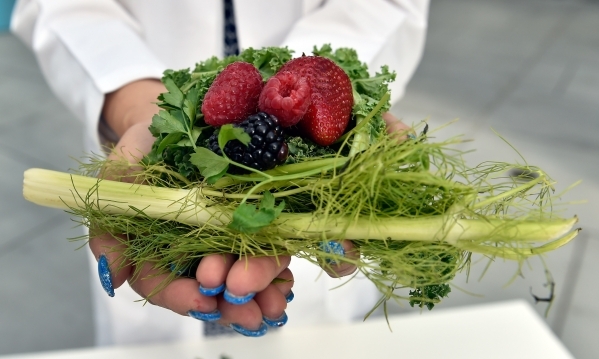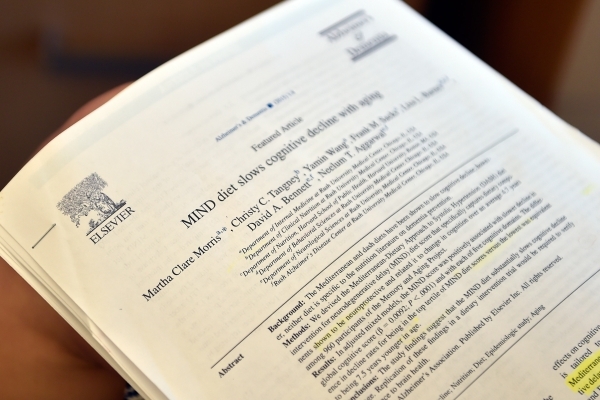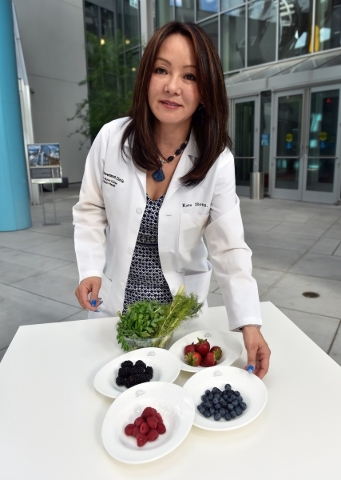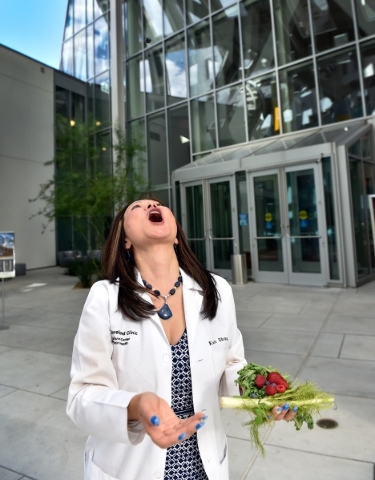MIND diet may help prevent or delay dementia, study suggests
If there were a new pill on the market that claimed it could lower the risk of developing Alzheimer's disease by 35 percent to 53 percent, and keep your brain younger by 7½ years with no negative side effects, would you take it?
What if the research was performed by a well-respected group of scientists at one of the country's leading Alzheimer's centers and funded by the National Institutes of Health? Interested now?
With Alzheimer's disease quickly moving up from the sixth-leading cause of death to the third underlying cause of death in the nation, it is a safe bet that most people would beat down their doctors' doors to get their hands on this magic pill.
So where can people get this amazing new drug?
Not so fast, the claims are real, but it's not a pill. It is the Mediterranean-DASH Diet Intervention for Neurodegenerative Delay, better known as the MIND diet.
Disappointed? Don't be. In this case, diet is not a four-letter word.
More than 2,000 years ago the father of medicine, Hippocrates, said, "Let thy food be thy medicine and thy medicine be thy food."
Researchers from Chicago's prestigious Rush Alzheimer's Disease Center at Rush University Medical Center recently published their significant findings in Alzheimer's & Dementia: The Journal of the Alzheimer's Association, which just may prove Hippocrates was on to something.
Rush's nutritional epidemiologists gathered data on food intake and tested the cognitive ability of 923 people living in retirement communities and senior public housing in the Chicago area over a 4½-year span to come up with their findings. The participants ranged in age from 58 to 98 with an average age of 81.4 years.
"This is a very good study conducted by a very good research team," said Dr. Kate Zhong, senior director of clinical research development for the Cleveland Clinic Lou Ruvo Center for Brain Health. The Chicago researchers developed and assigned a score for each food and then looked at a correlation between food scores and changes in the mental cognition of the participants, Zhong explained.
Experts agree that healthful eating may be the key to preventing or at least delaying the onset of Alzheimer's disease and other forms of dementia. The MIND diet is a hybrid of the Mediterranean and DASH (Dietary Approaches to Stop Hypertension) diets, which both result in similar research-based findings when strictly followed. Only the MIND diet still resulted in a 35 percent decrease in the risk of developing Alzheimer's when adhered to in a moderate fashion — think celebratory treats every once in a while.
The MIND diet consists of ordinary food: whole grains, green leafy vegetables, nuts, beans, fish, poultry, berries — specifically blueberries and strawberries — and one glass of wine a day. The hard part for most people is that it limits butter, cheese, fast or fried foods, and sweets.
Every 67 seconds, someone in the U.S. develops Alzheimer's, according to the Alzheimer's Association, which amounts to approximately 473,000 people age 65 or older developing Alzheimer's disease in the United States in 2015. So the big question becomes: Will a 35 percent to 53 percent decrease in risk of developing this life-altering disease motivate people to make a change in their eating habits?
"When we are younger, we just assume we are going to be healthy forever," said epidemiologist Maria Corrada, associate professor at the Institute for Memory Impairments and Neurologic Disorders at the University of California, Irvine. Corrada is co-director of the trailblazing Ninety+ Study, now in its 12th year of studying the brains of the "oldest old," which is the fastest-growing age group in the U.S.
"We don't know if it (Alzheimer's disease) has happened — we don't know if it's coming — we don't know if we are going to get it," Corrada said. "We should be trying these things because we know that a healthy diet is a good thing for many other reasons — so if it's going to work also for AD — why not try?"
Local board-certified internist Sarah Heiner estimates about 35 percent of her patients ultimately follow her lifestyle recommendations, which include changes to their eating choices, exercise, stress reduction and sleep quality. She estimates that medication compliance is much higher, at about 75 percent.
Why is it so hard to make those changes?
"Food is so tied up with so many things besides physical nourishment," local board-certified psychiatrist Marian Orr said. "The first thing that mammals do when they are born is inflate their lungs — the next thing they do is nurse."
Food is a part of us from the very beginning of life, Orr continued. It's all about feelings, celebrating, establishing relationships and alliances.
"When you're trying to change food, you're trying to change all that, too, and it's not easy," Orr said.
So does Orr think the MIND diet results will change people's attitude toward food?
"I think there's a segment of the population that is going to jump on that like a bug on a banana," she said. "There is a certain segment of the population that you're going to have to make it chic and cool (think Paleo diet) and who knows how long it will last, but (probably the largest) segment of the population that is going to go, 'I'm going to die anyway so I'm going to have fun.' "
The last population group Orr describes is one in which depression plays a major factor in their lives. In that case, "some people are just not going to do anything to help themselves," she explained.
How do people close the gap between knowing and doing?
Registered dietitian CindyBeth Palmer-Lynch said, "I don't see people making changes (in their diet) until they can see those incremental delays (of the disease) and tell us in a story." She believes that "people aren't motivated by numbers. They are motivated by the stickiness of stories and the things that have an emotional response — that's when people change."
To demonstrate tangibility, Palmer-Lynch carries an example of what 5 pounds of fat looks like for her clients to touch and feel and "wrap their head around." She also shows them the amount of sugar in a liter bottle of cola and demonstrates with big and small shoes her concept of the need to take "small incremental baby steps" when people decide to make dietary changes.
Will there ever be a magic pill for Alzheimer's?
"It takes about 15 years for a drug to go from the bench side to the bedside," Zhong said. "Despite all the advancements through clinical trials, we don't truly have a single treatment that can really treat Alzheimer's or reverse it."
Zhong theorizes that answers will come through a provisional strategy of treatment. "My thinking is that it is probably a combination of lifestyle and of some medication. By combining those, we will be able to really significantly either slow down the progression or prevent Alzheimer's," the research expert said.
With the recent infusion of an $11 million grant from NIH, Zhong hopes to increase big data in a very real way. Visitors to the center's interactive www.healthybrains.org website are able to input personal information into the Six Pillars of Brain Health: food and nutrition, physical exercise, social interaction, sleep and relaxation, brain fitness and medical health and come away with a brain health index and customized recommendations for improvement. The website is constantly updated as new scientific advances like the MIND diet unfold.
"You can actually grow a better and stronger brain by eating healthy," Zhong said.
Pass the blueberries, please.




















